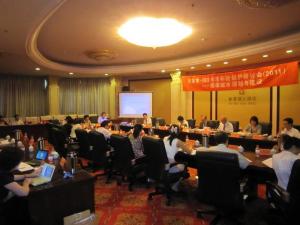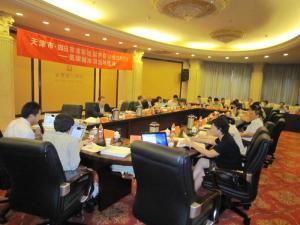Home > Workshop and Training > OVERSEAS > Fiscal Year 2011 > FY2011 Environmental Conservation Seminar held in Tianjin, China
Main content starts here.
Update:September 15, 2011
FY2011 Environmental Conservation Seminar held in Tianjin, China
 For three days from August 30 (Tues.) to September 1 (Thur.), 2011, a Yokkaichi-commissioned Environmental Conservation Seminar on Low Carbon Society was held in the City of Tianjin, China.
For three days from August 30 (Tues.) to September 1 (Thur.), 2011, a Yokkaichi-commissioned Environmental Conservation Seminar on Low Carbon Society was held in the City of Tianjin, China.
Tianjin, located in northeastern China is, along with Beijing and Shanghai, one of four direct-controlled municipalities with status equal to that of provinces or autonomous regions. The Central Committee of the Communist Party of China drew up the twelfth five-year plan, which started this year and will end in 2015. The environmental section of the plan is aimed at forming a resource-saving and environment-conscious society and at realizing the sustainable development of the country's economy as part of a low carbon society. To promote these goals, Tianjin has been designated by the government as a model city to draw up a local greenhouse gas inventory and to establish and improve greenhouse gas emission controls and monitoring systems to save energy and reduce emissions.
 ICETT has held an environmental conservation seminar in Tianjin as part of a Yokkaichi-commissioned program every year since 2001. For the above-mentioned reasons this year’s seminar concentrated on the establishment and planning of a low carbon society and city. It was attended by 36 participants including officials from the Environment Protection Bureau of Tianjin, experts from the Tianjin Scientific Research Institute of Environment Protection, and 15 local university students. At the round-table seminar, Japanese lecturers and Chinese representatives presented methods to prepare greenhouse gas inventories and monitor emissions, and city planning and construction technology to create a low carbon society, which was followed by a session to exchange opinions and views. There were positive comments from the participants: “It is very important that our economy reduces carbon dioxide emissions if it wants to continue growing.”, “Through the presentations and discussions with the lecturers, I have broadened my knowledge of the construction and planning of low carbon cities.”, and “I have learned a lot about the current situation regarding the Total Pollutant Load Control and the emissions trading system, and methods to use them, which is quite useful for my job.” (Fukushima)
ICETT has held an environmental conservation seminar in Tianjin as part of a Yokkaichi-commissioned program every year since 2001. For the above-mentioned reasons this year’s seminar concentrated on the establishment and planning of a low carbon society and city. It was attended by 36 participants including officials from the Environment Protection Bureau of Tianjin, experts from the Tianjin Scientific Research Institute of Environment Protection, and 15 local university students. At the round-table seminar, Japanese lecturers and Chinese representatives presented methods to prepare greenhouse gas inventories and monitor emissions, and city planning and construction technology to create a low carbon society, which was followed by a session to exchange opinions and views. There were positive comments from the participants: “It is very important that our economy reduces carbon dioxide emissions if it wants to continue growing.”, “Through the presentations and discussions with the lecturers, I have broadened my knowledge of the construction and planning of low carbon cities.”, and “I have learned a lot about the current situation regarding the Total Pollutant Load Control and the emissions trading system, and methods to use them, which is quite useful for my job.” (Fukushima)







